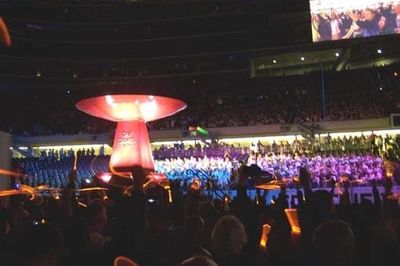Viewers from around the globe were able to watch the opening ceremony for the 2006 Gay Games VII Sports and Cultural Festival Saturday, July 15, 2006 at Soldier Field, the lakefront home football stadium of Chicago’s beloved Bears American football team. In addition to the thousands in the stands, the ceremony was available on broadband, mobile phones, and cable television thanks to coverage by Gay Games Global Sponsor PrideNation Network (PNN). PNN Radio also provided live radio updates throughout the festivities and events. Listeners were also able to tune in online and through mobile phones to hear the PNN Radio Games updates, and PNN provided smart phone and podcast updates.
Proud TV camera crews worked with Gay Games Chicago organizers to tape not only the opening ceremony but also the closing ceremony, July 22, at Wrigley Field, home of the Chicago Cubs. Crews recorded elements of all 30 Gay Games sports, cultural performances, celebrity and athlete interviews, and medal ceremonies. Gay Games Chicago and Proud TV will use the videotaped footage for post- Games television shows and a Gay Games souvenir DVD.
Over 12,000 athletes from more than 70 countries competed in 30 sports ranging from softball to dancesport, swimming to tennis. The eight-day event included band, cheerleading and color guard performances, chorus, an ancillary arts festival, and a series of community-organized social events and parties.
Gay Games included some straight athletes as well. Josh Noel said in the intro to a Chicago Tribune article on Friday, July 21, “Straights are glad to be part of Games - Common ground found in competition and camaraderie.” He quoted a Chicago food importer as saying, “Every once in a while, you might get hit on. You’ve just got to look at it as a compliment and move on.” Nash wrote further that officials have said that “though athletes are not required to disclose their sexuality at the Gay Games, a majority do, and about 5 percent have identified themselves as straight.”
Nongay competitors say they were motivated to join one of the world’s largest gay, lesbian, bisexual and transgender sporting events for the opportunity to compete in their favorite sport, be it ice hockey, ballroom dancing, or figure skating.
Derek Liecty, a longtime member of the Federation of Gay Games board, was quoted in Nash’s article as saying, “Although the Gay Games were started in 1982 to empower gay athletes and provide a place where they could compete without fear or prejudice, excluding straight people would be hypocritical.” It is believed by organizers and most competitors that the acceptance and courtesy of participation extended in the games to straight people will simply be returned to LGBT individuals.
